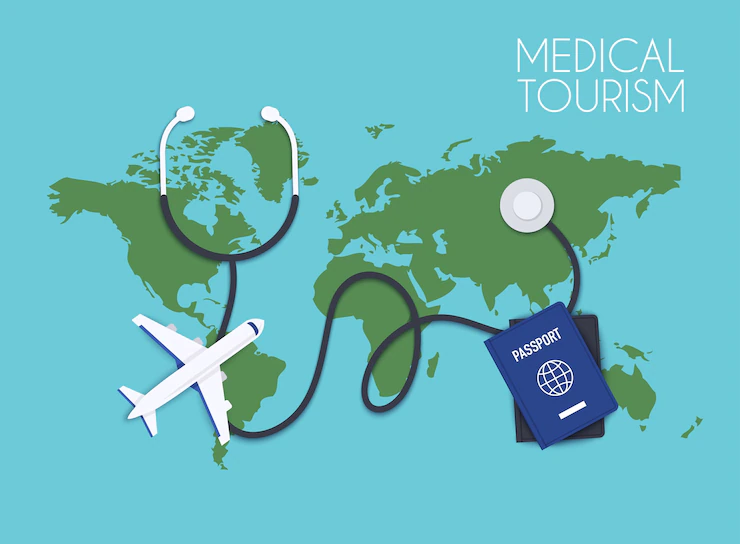The health tourism industry, also known as medical tourism, has seen exponential growth over the past decade. With patients traveling across borders for high-quality, affordable healthcare, the competition among clinics, hospitals, and healthcare providers to attract international patients has never been fiercer. To stand out in this increasingly global market, healthcare providers need to employ digital marketing strategies that enhance visibility, build trust, and foster patient engagement.
In this blog, we’ll explore why digital marketing is crucial in the health tourism industry and how it can help healthcare providers expand their reach and build a strong online presence to attract international patients.
1. Reaching a Global Audience
One of the primary benefits of digital marketing is its ability to help health tourism providers reach a global audience. Medical tourists are no longer limited by geographic location, and they are increasingly using the internet to find healthcare providers abroad. Whether they are looking for affordable dental care, cosmetic surgery, fertility treatments, or specialized surgeries, patients rely on digital platforms to research options, compare prices, and make informed decisions.
Digital marketing strategies, such as SEO (Search Engine Optimization), social media marketing, and content marketing, allow healthcare providers to connect with potential patients worldwide, positioning themselves as accessible and reliable choices for healthcare services.
What can healthcare providers do?
- Optimize your website for international SEO to ensure that patients from different countries can find your clinic when they search for relevant treatments.
- Create content in multiple languages or use translation services to cater to a wider, more diverse audience.
2. Building Trust and Credibility
Trust is a significant factor when it comes to health tourism. Patients often feel nervous about seeking medical care abroad, particularly when it involves serious or elective procedures. As a result, they place a great deal of trust in the clinics and doctors they choose. Digital marketing plays a pivotal role in building this trust and establishing credibility for healthcare providers.
Key ways digital marketing can build trust:
- Patient reviews and testimonials: Positive reviews from past patients provide social proof that can greatly influence the decision-making process for new international patients. Displaying authentic testimonials and success stories on your website, social media profiles, or third-party review platforms helps establish your clinic’s reputation and credibility.
- Accreditations and certifications: Displaying industry certifications and accreditations (e.g., Joint Commission International (JCI) or ISO certifications) on your digital platforms reassures patients that your clinic meets international standards of care and safety.
- Educational content: By offering valuable and informative content—such as blog posts, videos, and infographics—healthcare providers can demonstrate their expertise, which helps build trust with potential patients. Addressing common patient concerns, detailing treatment options, and explaining the benefits of traveling abroad for specific medical procedures all contribute to gaining patient confidence.
What can healthcare providers do?
- Showcase patient success stories and before-and-after photos of treatments on your website and social media.
- Publish educational content such as blogs, video tutorials, and FAQs that answer common questions about procedures and what patients should expect.
- Highlight accreditations and medical certifications to emphasize your clinic’s professionalism and quality of care.
3. Targeting the Right Audience
Digital marketing allows healthcare providers to precisely target their ideal audience. Rather than relying on traditional marketing methods, which cast a wide net, digital marketing uses data analytics to reach individuals who are most likely to seek medical treatments abroad.
Through pay-per-click (PPC) advertising, social media targeting, and email marketing, health tourism providers can segment potential patients based on criteria such as location, interests, behavior, and search history. This ensures that your marketing efforts are reaching individuals who are genuinely interested in the services you provide.
What can healthcare providers do?
- Use Google Ads and Facebook Ads to create targeted campaigns that focus on specific geographic regions, medical conditions, or types of treatments.
- Segment email marketing lists based on patient preferences, providing personalized content that resonates with each group.
- Track and analyze user data to continuously refine and optimize your marketing campaigns, ensuring they reach the right audience.
4. Improving Patient Engagement
Engaging with potential international patients is crucial for converting leads into booked appointments. Digital marketing allows healthcare providers to connect with patients through a variety of online channels, building long-term relationships that lead to patient loyalty and positive word-of-mouth referrals.
Social media, for example, is an excellent platform for creating direct, two-way communication with patients. Through social media platforms like Instagram, Facebook, and YouTube, healthcare providers can interact with patients, answer questions, and showcase real-time updates on treatments, facilities, and services.
Benefits of patient engagement through digital marketing:
- Answering patient questions: Providing instant support via chatbots, live chat, or responding to queries on social media can help address potential concerns and build rapport with patients.
- Sharing updates and offers: Posting regular updates about new services, special promotions, or discounts can help keep patients informed and engaged, leading to higher conversion rates.
- Community-building: Engaging with patients through content that resonates with them helps foster a sense of community. This can include sharing patient success stories, personal recovery journeys, or testimonials from patients who have had similar experiences.
What can healthcare providers do?
- Respond promptly to comments, messages, and reviews on social media and other online platforms.
- Use social media stories or live sessions to engage with patients in real-time, answering their questions and giving them insights into treatments.
- Develop a patient loyalty program to encourage repeat visits and referrals.
5. Cost-Effectiveness and ROI
Digital marketing offers cost-effective alternatives to traditional forms of advertising such as TV, radio, or print ads. Platforms like Google, Facebook, and Instagram allow healthcare providers to run highly targeted campaigns at a fraction of the cost. This is especially beneficial for smaller clinics or healthcare providers looking to expand their reach without large marketing budgets.
By continuously optimizing campaigns and using analytics tools, healthcare providers can track their return on investment (ROI) and make data-driven decisions about where to allocate their marketing resources.
What can healthcare providers do?
- Focus on high-impact, low-cost marketing channels like SEO, social media, and email marketing to maximize their budget.
- Track the performance of marketing campaigns using Google Analytics and adjust strategies accordingly to optimize results.
- Use remarketing strategies to re-engage visitors who have shown interest in your services but haven’t yet booked an appointment.
6. Enhancing Visibility through SEO
SEO (Search Engine Optimization) is an integral part of any digital marketing strategy, especially for healthcare providers in the health tourism industry. When potential patients search for specific medical treatments online, you want your clinic to appear at the top of the search results.
With proper SEO strategies, such as keyword optimization, local SEO, and content creation, healthcare providers can increase their visibility in global search engines and attract more patients from around the world.
What can healthcare providers do?
- Invest in SEO to optimize your website for relevant keywords related to medical tourism (e.g., “best dental clinics in Mexico” or “cosmetic surgery in Thailand”).
- Create local SEO strategies that target international patients from specific countries or regions.
- Regularly update your website with fresh, high-quality content that addresses the most common patient questions.
Conclusion: Digital Marketing as the Key to Success in Health Tourism
As the health tourism industry continues to grow, digital marketing is no longer optional for healthcare providers—it’s essential. From improving global visibility and building trust to targeting the right audience and engaging with patients, digital marketing strategies offer an array of tools to help clinics and healthcare providers succeed in the competitive world of medical tourism.
By leveraging the power of digital marketing, healthcare providers can not only increase their patient base but also build long-lasting relationships with international patients, offering them the quality care they need at competitive prices.
If you want your health tourism business to thrive in this global market, embracing digital marketing will be your key to success. It will help you connect with patients, build credibility, and ultimately grow your clinic’s international reputation.


